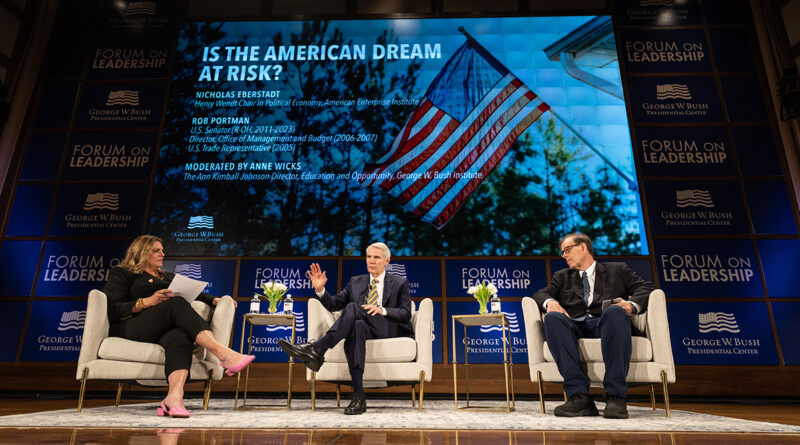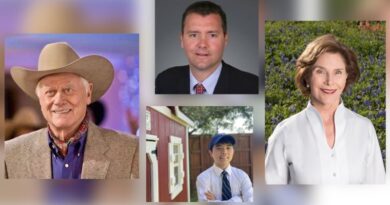Is The American Dream at Risk?
Bush Center panelists want U.S. to bridge divides, workforce ‘skills gap’
Panelists for the Bush Center’s sixth-annual Forum on Leadership see the troubles threatening the American dream, including challenges in education and workforce readiness.
But former Sen. Rob Portman (R-Ohio) and Nicholas Eberstadt of the American Enterprise Institute aren’t ready to abandon American optimism just yet.
“Bet on Americans and our American ideals,” they advised.
Anne Wicks, the Bush Institute Ann Kimball Johnson director of education and opportunity, moderated the panel discussion.
“The American dream is this idea that all Americans have access to opportunity, upward mobility is possible, hard work is rewarded,” she said. “But if you look at the headlines today, sometimes it can seem like the American dream is a little bit more of a myth than reality. People struggle to save, struggle to pay down debt, (and struggle to) buy a home.”
“At the same time, we know that millions of people around this world are trying to come to this country for their shot at the American dream,” Wicks said.
Portman described the situation this way: “What we face today is that although the rising tide lifts all boats, not everybody’s on the boat, so we do have a challenge.”
“My biggest concern is that in the current environment, not just in politics, but in our society in general, we’re pushing people to the extremes and not recognizing that we as a country have this huge opportunity,” Portman said. “So many people want to come to America and to be Americans because they see it.”
The panelists focused on what they see as a “skills gap” preventing some from accessing the dream and the dignity and self-respect gained by working.
“These middle-skills jobs in Texas and Ohio and around the country – people don’t have the skills to access them,” Portman said.
“It’s almost amazing to think that we’ve got this peacetime labor shortage with almost 10 million jobs that are unfilled at the same time that we’ve got millions and millions of working-age men and women sitting on the sidelines still,” Eberstadt added. “From the end of the Civil War until just a little while ago, the U.S. was number one in education. We had more years of schooling, better schooling … and our educational attainment was growing faster than anywhere else in the world even though we were number one, and that was a big part of America’s global lead and a big part of the foundation for our national prosperity.”
Wicks said she remains optimistic about the state of the nation but advised listeners to be realistic about its challenges: “What I’m going to take away from today is bet on Americans and our American ideals, but be clear-eyed about the challenges in front of us and get closer to each other not farther apart.”









